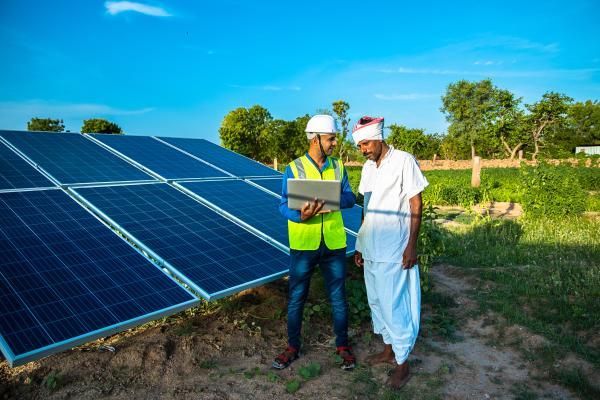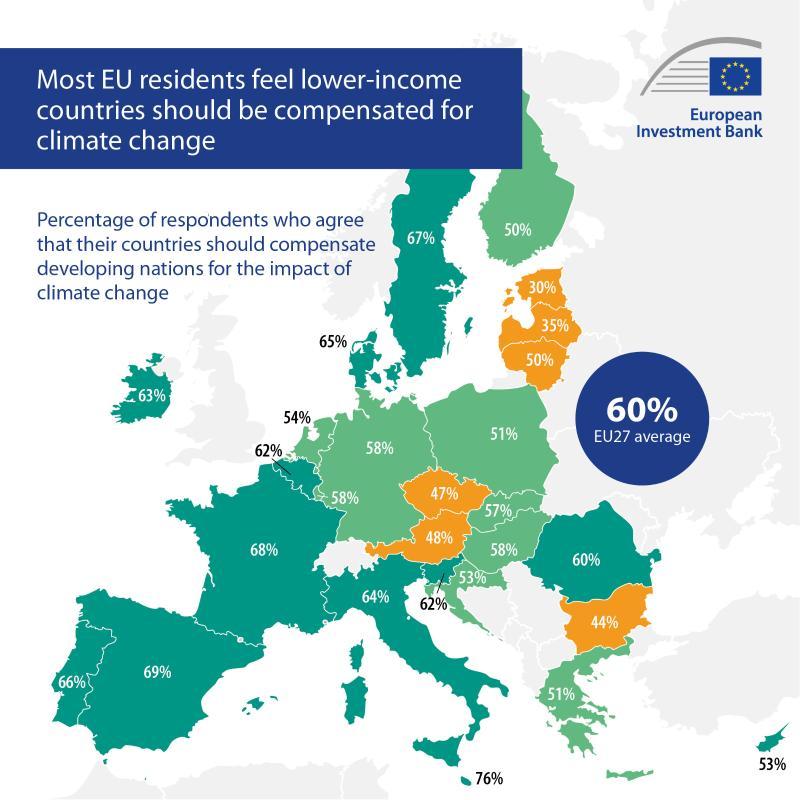
- Climate and environmental concerns top the list of challenges South Korean respondents see for their country.
- 87% favour eliminating subsidies and tax breaks for the aviation sector and all companies that rely heavily on fossil fuels.
- 71% say they would accept an income-tax increase to help people with the lowest incomes adapt to climate-related policies.
- 76% believe the government should provide financial compensation to affected countries for climate change they did not contribute to.
The European Investment Bank (EIB) today launched the sixth edition of its Climate Survey. These are some of the most striking results of this annual survey conducted in August and September 2023. Running since 2018, the EIB Climate Survey offers insights into the climate change-related views of people in major economies around the world, with more than 30 000 respondents in the European Union, the United States, China, India, Japan, the United Kingdom, UAE, Canada and South Korea. The EIB is the lending arm of the European Union and the world’s largest multilateral lender for climate action projects.
After another challenging year marked by record heatwaves and droughts in several parts of the world, South Koreans have become acutely aware of the profound impact of climate change and the need for immediate action in their country and around the globe, according to the results of the EIB Climate Survey. Climate change impacts and environmental degradation are considered the number one challenge[1] for most respondents (65% of respondents place it in the top three concerns for their country). The rising cost of living is not far behind, with 49% considering it a major concern, followed by political instability (44%).
Confident expectations about the green transition
South Koreans are confident about the outcome of climate policies. 64% of respondents (a figure close to that of the United States and China and to the EU average but 17 points above Japan) believe that climate policies will improve the quality of their daily lives. 56% of respondents (similar to the US figure, 5 points above the EU average and 7 points above Japan) also think that the policies will create more jobs than they will eliminate.

Taxes to support a just transition in South Korea
Survey results show that 71% of South Koreans would be willing to pay more income tax to help lower-income households cope with the costs of a green transition. 57% would agree to pay an extra 1-2% of their income and 14% would agree to an extra 5-10%.
Most South Korean respondents said they would also be in favour of other kinds of climate-related measures. For example, there is a consensus (87%) in favour of a fossil fuel tax reform to eliminate subsidies and tax breaks for the aviation sector and other industries that rely heavily on fossil fuels.
Financial compensation for developing countries
On the question of compensation to developing countries to help them deal with the impacts of climate change — expected to be a central issue at the 2023 UN Climate Change Conference in Dubai (COP28) —an overwhelming majority of South Koreans are in favour of extending aid beyond their borders to support countries most vulnerable to climate change and ensure a globally just transition to a climate-neutral and resilient future.
76% (13 points above the United States, 16 points above the European Union and 4 points above Japan) agree that the country should financially compensate affected countries to help them fight climate change.
[1] Respondents had to select the three challenges they consider the biggest for their country from a shuffled list of ten challenges: Increased cost of living, unemployment, climate change, environmental degradation, political instability, income inequalities, access to healthcare, large-scale migrations, cyberattacks, and terrorism.
Background information
About the EIB Climate Survey
The European Investment Bank (EIB) has now completed the sixth annual EIB Climate Survey, a thorough assessment of how people feel about climate change. Conducted in partnership with the market research firm BVA, the sixth edition of the EIB Climate Survey aims to inform the broader debate on attitudes and expectations in terms of climate action. More than 30 000 respondents participated in the survey from 7 August to 4 September 2023, with a representative panel of people aged 15 and above for each of the 35 countries polled (EU 27, the United States, China, the United Kingdom, India, Japan, South Korea, Canada and UAE).
About the European Investment Bank
The European Investment Bank (EIB) is the long-term lending institution of the European Union owned by its Member States. It is active in more than 160 countries and makes long-term finance available for sound investment in order to contribute towards EU policy goals.
- In 2019, the EIB adopted an updated energy lending policy ending financing to any unabated fossil fuel energy projects, including natural gas. The EIB was the first multilateral development bank to do this.
- In 2021, the EIB also became the first multilateral development bank to align its financial activities with the Paris Agreement.
- Through its Climate Bank Roadmap, the EIB Group aims to support €1 trillion of investment in climate action and environmental sustainability through the critical decade 2021-2030.
- It also made a commitment to increase investment in climate action and environmental sustainability to more than 50% of its annual lending by 2025 (last year that goal was exceeded with a figure of 58%).
EIB Global is the EIB Group’s specialised arm dedicated to operations outside the European Union and is a key partner of the EU Global Gateway strategy. It aims to support at least €100 billion of investment by the end of 2027, around one-third of the overall target of the Global Gateway. Within Team Europe, EIB Global fosters strong, focused partnerships alongside fellow development finance institutions and civil society. EIB Global brings the Group closer to local communities, companies and institutions through its offices across the world.
About BVA Xsight
BVA Xsight is a pioneer in market research and consulting. With their sector-specific knowledge and skills, its 400 experts analyse the unique facets of individuals' lives. They provide in-depth and actionable insights, enhancing decision-making and organisational performance.
BVA Xsight operates both in France and internationally, partnering with public and private organisations. Recognised with multiple awards for its innovation capabilities, BVA Xsight stands out for its teams' commitment and passion for the profession.
Founded in France in 1970, BVA Xsight is a mission-driven company and is part of the international BVA Group.
Find out more about BVA Xsight: www.bva.fr